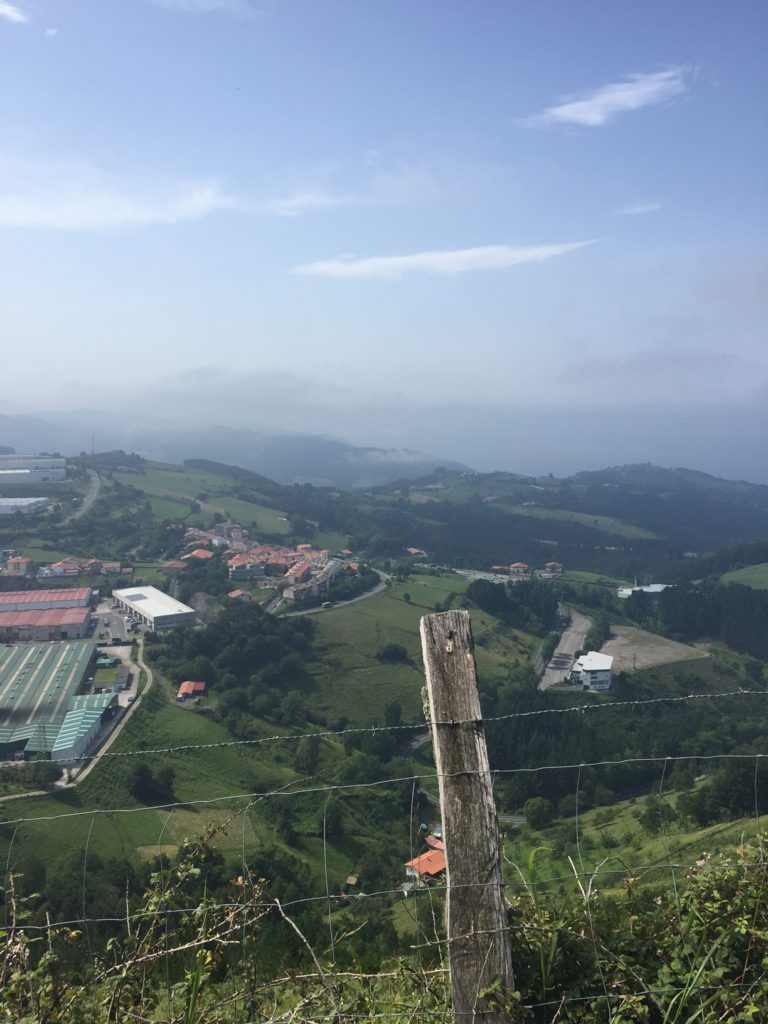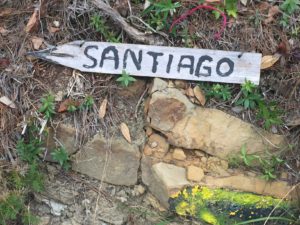crossing paths with the three wise men
Sometimes, we get lost. I had lots of time to think about this today, as I kept recovering from multiple missteps. The Camino giveth yellow arrows, and the Camino taketh away.
I got lost at the edges of cities, trying to find my path where it crosses those of others, knowing it existed but unclear how to find it. Like what to do with your life: sometimes, you take a wrong turn, or follow a sign that leads you wrong. Vandalism covered or changed some of the arrows I needed – signs twisted, yellow scratched out or brushed over with gray. I sighed as I admitted I had lost my bearings yet again.
The trick was to ask for help. However, this was not my forte. It was not even my baseline – it was my Achilles’ heel. I was a go-it-alone girl in a kick-you-when-you’re-down world. But now I was getting lost in strange cities in a foreign country with minimal language skills. I felt a persistent niggling in the back of my mind to consider what vandalism to my heart had obscured the arrows I needed in life to find my way.
Sucking up the useless pride of the hopelessly lost, I asked for help. And since I seemed to walk alone so much, I asked for directions over. And over. And over. When I felt like I was headed in the wrong direction, I stopped, apologized to some local person living their life, and asked the way. Typically, I was about to miss my turn if I hadn’t asked.
Traveling with others, it was so simple. I exchanged listening to Americans discuss TV shows for the surety of multiple heads finding the way together. So much easier. Except that I don’t watch TV and had no idea what they were talking about. I preferred my solo time. Peregrina sola.
By the time I got to Itziar, I was so tired. And alone. Without thinking, I followed the yellow and white stripes that often replaced the yellow arrows through towns. Unfortunately, these particular stripes marked routes joining the Camino from other mountains. But without arrowheads, you don’t know that. And without asking, you sure don’t know that. So I followed them up the wrong mountain.
That’s right. For a couple of hours, I hiked a steep, rocky path in the completely wrong direction. I heard a vehicle, and turned behind me to see that workmen were hauling building materials to the top of this mountain with a huge ATV truck of some sort. One guy hopped off and asked me where I was headed, where I came from today. When I told him I came from Zarautz and was going to Deba, I gestured up over the mountain.
“Deba? No Deba,” he responded, pointing clearly up my mountain – which I had nearly summited. He pointed back down to the last town, traced his finger completely across the valley, then over the opposite mountain instead. “Deba.”
I heaved a heavy sigh, then smiled wanly. “Gracias. Buenos dias.” What else was there to do?
So I walked back down the long trail, humming, “We’re on the road to nowhere…,” which seemed to be my official theme song now. I got down to the road leading into town. I stopped at the gated house of a family and called out, “Ayuda por favor? Necessito agua, por favor.” Judging by my beet-red face, heavy backpack, and obvious air of exhaustion, the mother took my empty water bottle, wisely left this dusty, desperate peregrina outside the locked gate, and brought back cold, clear water. “Muchas gracias, muchas gracias,” I panted, then turned and gulped sloppily. Lookin’ good, sister, I imagined 17-year-old me saying from beside me. You have this thing totally handled.
Stowing my water, I started walking again, when an older man hailed me from the bus stop, walking across the road to me. “Peregrina?” he called, or his word meaning such, as there were so many languages in this part of Spain. “Is something wrong?” I think he asked. “Where you go?” I figured out.
“Deba.” He looked puzzled. I pointed, exasperated with myself, up the wrong mountain I had just descended. “Camino de Santiago de Deba? NO.” I pointed across the right mountain. “Deba.”
He looked genuinely concerned, and sympathetic to this clearly incompetent pilgrim sweating profusely under her burden of self-sufficiency. “Autobus de Deba,” he told me, as if solving the matter. “Un minuto.”
“No no,” I protested.
“Un minuto.”
“Camino a pié,” I protested again, as if I hadn’t already walked enough kilometers to more than match the distance ahead. I then looked at my watch: it was 5:30pm. “Albergue,” I said in resignation, watching the second hand sweeping away my chance for a bed that night.
Thus did my savior San Juan pay for my bus with his bus card, as his friends San Antonio y San Fernando chimed in, helping me stuff my backpack into a seat. They kept up a cheering, happy banter, and told the bus driver where I needed off, the tourist office. I kissed Juan and Antonio goodbye as Fernando, who kept hoping and asking if I spoke French, walked me to the tourismo.
The guía in Deba was matter-of-fact. “The albergue municipál is full – completo. But you can get a start on tomorrow if you walk to the next albergue.”
“How far?”
Five kilometers away.”
A 5K at the end of a day of mountain hiking. That’s only three miles, only three miles, I kept telling myself. I arrived at my albergue at 8:30pm – where I found a plate of hot food waiting for me.
Asking for help is not a weakness. We need each other, like I had needed the construction man’s pointed advice, the mother’s clear water, and the gift of being transported by the saints. Guidance merely keeps you on the way; it doesn’t walk the walk for you. These were all gifts, of openness, empathy, and compassion. They all brought me clarity.
I felt like I had gotten away with my final act of peregrina obstinada, gotten off easy, and vowed I had learned my lesson about asking for help. If I hadn’t, I would have blown out my Achilles’ heel for real, on an unnecessarily steep and rocky mountain of my own choosing. I could feel 17-year-old me grinning at me as we walked along toward the albergue in the descending twilight, putting a tentative arm around my waist. Such a crazy rebel, she scoffed affectionately, our feet aching.
As I said when I kissed Fernando goodbye: “c’est la vie, no?”
three Basque saints, kind upon their shining thrones
in the plexiglass bus stop
erremos?
peregrina?
he calls to me, San Juan crossing the road
who pays for my burden and my mistakes
and my bus fare to Deba
they are all baptized in vino tinto
Rioja!!
and smell as bad as I do
smell as
saints who’ve lived
San Antonio sits across the bus aisle
he encourages me in my doubtful moments
and gives me a smile
to carry along the Camino
San Fernando offers words and passion
jokes and laughter
safeguarding my passage
through the twists and turns
of this town
this life
walks me to the bridge beyond
and gives me my name as a canto
I offer back a kiss goodbye
each one my humble
gracias
for the gift
of coming to my rescue
